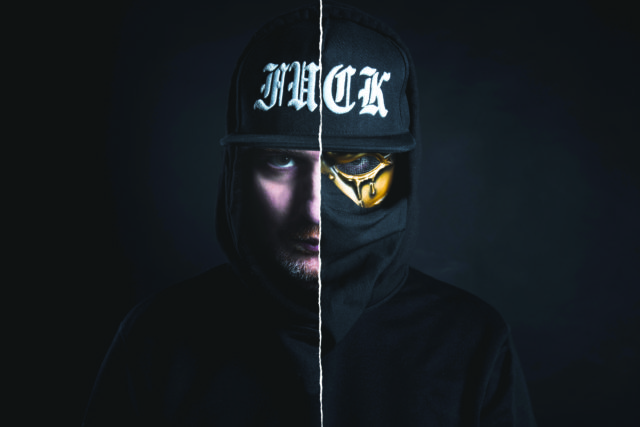
In a post-Daft Punk world, putting on a mask to hide your identity has almost become a prerequisite for emerging DJs. SBTRKT, Deadmau5, Marshmello and Cazzete are just a few names from a list that goes deep into the abyss of electronic subgenres. For some DJs the mask is a gimmick, an excuse to add more lights and mystery to an overpopulated music community. For others, a mask is a filter, separating what’s important — the music — from everything else.
Just as Daft Punk introduced the world to their brand of funky-inspired dance music as two robots from parts unknown, UZ, aka Guillaume Barbier, donned a mask and ushered trap music into the electronic dance era.
Although the real pioneers of the synthesized, 808 bass-drenched trap genre stem from Southern hip-hop legends such as Lil’ Jon and T.I., Barbier made trap his own, fusing it with gritty, industrial synths, thick drum patterns and hip-hop sound samples that have now become a staple of the genre.
After learning how to play guitar and drums proved insufficient to satisfy his musical appetite, Barbier delved into digital production.
“[I] got into turntablism/DJing around 1996 or ’97, and music production around 2000,” the French DJ says via an email interview, retaining that secretive persona he’s known for. “I started by making beats and scratching break-beats, and then I progressed from hip-hop beats to electro/house/pop to dubstep, to finally concentrate [on] making trap beats until today.”
Barbier took on the moniker DJ Troubl and made a name for himself on some of the most prestigious dance floors on the planet.
But he longed for a way to distance himself from his music and let listeners make opinions without having to worry about the person that makes it. That’s when Barbier donned the mask and became UZ.
“I decided to start the project UZ anonymously on the internet at the beginning of 2012,” he says.
Beneath the golden mask, made by FX artist Ralis Khan (who also designed the masks for Slipknot), Barbier took mystery very seriously.
“I created my own alphabet to respond to comments and tweet people,” he explains.
After five years as the mysterious UZ, Barbier revealed his identity for the first time during a show at Los Angeles’ Belasco Theater earlier this year.
“When I heard the track ‘Mask Off’ by Future, I immediately thought, ‘Why not close the set with it and actually take the mask off?” Barbier explains. “We talked to the crew and everyone loved the idea.”
The decision to reveal his identity comes from difficulties of managing celebrity status and the daily ins andouts of making and releasing music.
“At the start, the secrecy was fun for the first few years but it became really difficult after that,” he says. “Also, it kept me isolated from people and was not fun anymore. We’re way more relaxed now, especially since people now know who I am.”
Barbier is currently touring after releasing the latest UZ album, Layers, an ambitious yet well-contained project full of features and co-collaborators.
“I wanted to do a record that you could listen back in a few years and still think it’s a classic,” Barbier says. “I wanted to try different things, keeping it dark but yet still powerful, and having rappers, vocalists, etc., and still sound like UZ.”
One of the stand-out tracks on the LP is “Bang,” a heavy set track with a long list of collaborators, including fellow trap artist Stööki Sound, Grime artist Onoe Capone and French rap duo Foreign Beggars.
“We had the track done with Stööki Sound and we felt like it would sound even better with vocals,” Barbier says. “I immediately thought of my friends from Foreign Beggars. I’ve known them for like 15 years or so, so I sent them the track. Pavan [Mukhi] was immediately down to record and he suggested grime artist Onoe Caponoe for a second verse. They sent the track back and we loved it.”
Barbier’s passion for trap extends past his own music. Quality Goods Records is his personal music label, housing artists like Sumthin Sumthin, Oski and Big Makk.
“[Quality Goods] is what motivates me right now, and I love looking for new talents and helping them release their music,” Barbier explains. “We’re also starting to release singles in a couple of months and really focusing on creating our own sound and growing a family of artists/producers.”
Trap music is often criticized for being a one-trick pony fad that will eventually fade away, but Barbier begs to differ.
“Trap music has been here for years and will be there for a long time. From the real trap music (Southern hip-hop) that’s been here for years to mainstream DJs playing trap on festival main stages, it’s definitely here to stay.”
On the Bill: UZ. 9 p.m. Bluebird Theater, 3317 E. Colfax Ave., Denver, 303-377-1666. Tickets $20.














